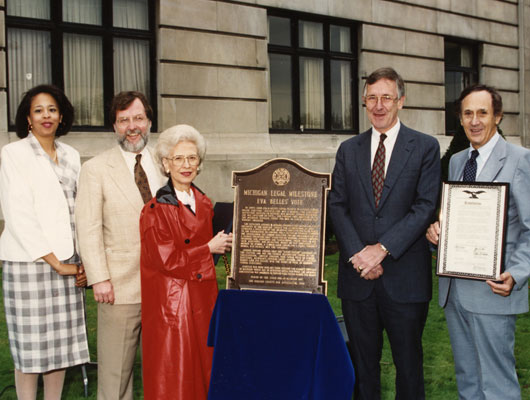Michigan Legal Milestones
11. Eva Belles' Vote

In April 1888, Eva R. Belles tried to vote in a Flint school board election. Because she was a woman, the election inspectors refused to receive her ballot. Firmly believing she was entitled to vote, she fought that decision up to the Michigan Supreme Court, and won an early victory for women's suffrage.
Complete Text on Milestone Marker
Eva Belles' Vote
In April 1888, Eva R. Belles tried to vote in a Flint school board election. Because she was a woman, the election inspectors refused to receive her ballot. Firmly believing she was entitled to vote, she fought that decision up to the Michigan Supreme Court, and won an early victory for women's suffrage.
She retained George H. Durand, former Flint mayor and first president of the Genesee County Bar Association, as her attorney. A provision of the Michigan Constitution gave power to the legislature to provide for a system of primary schools. The legislature set school election voting qualifications in a statute specifying that "every person" meeting certain criteria, including age, property, and parenthood, could vote in all such elections not involving money or tax questions. As mother to Jennie, a school-aged child, and a Flint property owner, Eva Belles met the criteria.
George Durand argued that the "every person" language of the statute, and not the gender restriction found in the Constitution, should control who could vote in school elections. Michigan's Supreme Court agreed, and as a result, women like Eva Belles won the right to vote in certain school elections.
A battle had been won, but final victory for women's suffrage in Michigan would not be achieved until 1918, when the Michigan Constitution was amended to provide full voting rights for women.
Placed by the State Bar of Michigan and the Genesee County Bar Association, 1990.